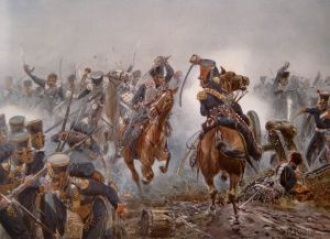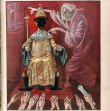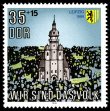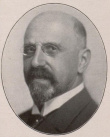Battle of Nations (Battle of Leipzig)
Christoph WernerTranslated by Christoph Werner (Weimar, Thuringia), edited by Michael Leonard (Petaluma, California)
When we read history books and encyclopedias about military battles of the past it does not often effect us deeply since it happened such a long time ago. But when we encounter the reports of eye witnesses, the soldiers and the civil population, the picture changes. Now the past becomes the present because we get to know the unspeakable, the excruciating suffering of the people, which for us Germans was the price we had to pay for the liberation of Germany and large parts of Europe from Napoleonic foreign rule. Liberation. Foreign rule. I was tempted for a moment to put those words in inverted commas, because that liberation was of doubtful benefit, and the foreign rule was merely another form of being dominated – not necessarily more difficult to endure – by those in power.
The Battle of Nations was largely fought outside the city, in villages and places named in the war reports (therefore the Germans call it "die Völkerschlacht bei Leipzig"). Those villages are now all part of the city of Leipzig. In 1813 Leipzig had about 33,000 inhabitants, roughly half the number of people living in Weimar today. The soldiers involved numbered about 470,000, of which 300,000 were of the allied nations Prussia, Russia, Austria and Sweden, and 170,000 were Napoleonic, i. e. French and the troops of the Confederation of the Rhine allied with Napoleon.
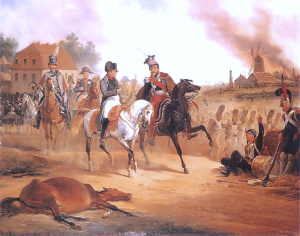 At the end
of the three day battle 16,000 Prussians, 22,000 Russians, 14,500 Austrians and
38,000 French and allies had been killed or were wounded, which in many cases
meant eventual death, as well. These numbers are comparable to the battle of
Stalingrad in the Second World War.
At the end
of the three day battle 16,000 Prussians, 22,000 Russians, 14,500 Austrians and
38,000 French and allies had been killed or were wounded, which in many cases
meant eventual death, as well. These numbers are comparable to the battle of
Stalingrad in the Second World War.
In the following excerpt from my novel "Um ewig einst zu leben, Caspar David Friedrich and Joseph Mallord William Turner" ("To live in all eternity, Caspar David Friedrich and Joseph Mallord William Turner, a Novel") this experience of battle is reproduced, referencing the topic begun above:
Reverend Gottlieb, despite his jolly manner, was a serious man, who had seen worse times and not forgotten them. During the Battle of Nations AD 1813 he had been an army chaplain with the Saxon army corps and had, with a part of the Saxon troops, deserted and gone over to the Allies on the 18th of October. Some of the deserters were among the 6,000 who had survived Napoleon’s retreat from Moscow, which was all that remained of the original 21,000. The agonies of the soldiers suffered during the retreat cannot be put into words, and those who had been quickly killed by the cossacks and Russian peasants could regard themselves as lucky.
After the Battle of Leipzig thousands of the wounded and the dying, among them a considerable number of French, were carried into the churches in Leipzig which had been transformed into military hospitals. There they fell into the hands of the surgeons who sawed, hacked, cut and cauterized the wounds while men moaned and screamed. The scene could break one's heart. Moreover, the hospital fever raged so that only few succeeded in coming out alive. Daily the dead, robbed of their clothes, were thrown out of the windows onto the streets, and large rack wagons were filled to the brim with dead. The wagoners stepped on the dead bodies while stacking them and worked with rolled up sleeves as if they were handling wooden logs. Often, soldiers refused to be taken to the hospitals because they believed they would certainly die there. They preferred crouching on a street corner or on the stairs of a house in the dim hope of survival.
 Reverend
Gottlieb tried to dispense consolation wherever he could, and jotted down the
last words of many in order to take them, and if this was not possible at least
send them to their mothers, fathers, sisters, brides and wives left behind.
Reverend
Gottlieb tried to dispense consolation wherever he could, and jotted down the
last words of many in order to take them, and if this was not possible at least
send them to their mothers, fathers, sisters, brides and wives left behind.
The horrors he witnessed did not embitter him towards the people who caused such great suffering to one another. Rather, it only increased his sense of pity.
Unlike his friend Caspar David Friedrich, he could not, despite what he had experienced, share the hate his fellow countrymen felt for the French. He had seen too many of them dying or dead, and he would never forget the images of the retreat of the French from Leipzig. The regiments broken up and in dissolution stumbled through the streets and mixed with baggage carts, cattle, ammunition wagons and guns. Left lying were overturned carts, dead and wounded soldiers, horses whose bowels hung out of their bodies and had become tangled in their legs as they desperately tried to get up. And all this happened under the continuous thunder of guns and the flashes of powder.
He patiently endured the reproaches leveled at him for aiding the Catholic enemies with the same Christian charity that he granted the Saxons. He could have pointed to the doctor and painter Carus – though he did not – who disregarding all national barriers had in 1813 become head physician of a French military hospital, for which he had even been promised the order of the Legion of Honor.
Recommended reading:
Werner, Christoph. 2006. Um ewig einst zu leben. Caspar David Friedrich und Joseph Mallord William Turner. Roman. (To Live in all Eternity. Caspar David Friedrich and Joseph Mallord William Turner. Novel.) Weimar: Bertuch-Verlag.




